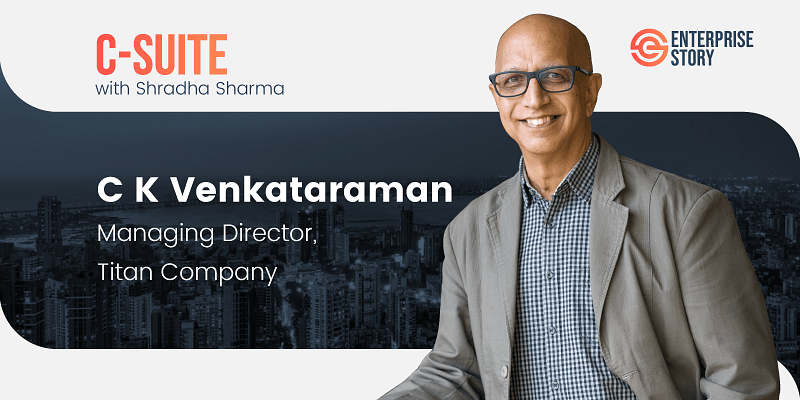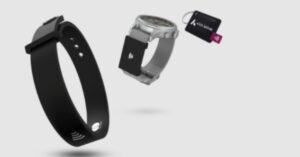When CK Venkataraman took over as the MD of Titan Company in October 2019, little did he know that he would be faced with one of the steepest challenges of his career within the next six months.
A Tata Group veteran of 30 years, Venkat had served as the CEO of Titan’s jewellery business since 2005, before replacing long-serving MD Bhaskar Bhat who retired.
As India went into a stringent lockdown starting March 2020, Venkat had to find ways to create the desire for Titan’s lifestyle products in homebound consumers. The company’s diversified offerings — from watches, jewellery, and ethnic wear to sunglasses, bags, perfumes, wearables — may not have featured in the list of pandemic essentials.
Even though Titan’s retail outlets started reopening in a phased manner towards the end of 2020, the second wave in 2021 harmed the business even more.
“It was a big jolt in all our lives. We were staring at the worst quarter (Q1 FY21) in the history of Titan. Even as it began, we knew it would be a terrible quarter,” Venkat tells YS Founder and CEO Shradha Sharma in an exclusive interview.
U-shaped recovery and long-term view
But because of Titan’s legacy status and trusted relationships with customers, distributors, franchisees, vendor partners, and the community, it could be “resilient”.
Venkat shares, “Even when we were making huge losses month after month, we doubled our CSR efforts. Titan, because of its overall strength and competitive advantages, was in a strong situation. Whereas the other stakeholders were relatively weaker, and we lent them a gentler hand in the short term. No pay cuts, no retrenchments, soft loans to vendor partners, grants to franchisees and NGOs. It went a long way in alleviating their misery and created goodwill for the company. Those stakeholders paid back more by working harder to recover sales.”
Even though Titan’s stock has nearly doubled in the last one year, its business recovery has been a tad slow. But the MD isn’t “worried”. Instead, he chooses to take a medium-to-long-term view.
He explains, “We are seeing a U-shaped curve versus a V-shaped one. But we’re not thinking much about the speed of recovery. Because as a company, we typically focus more on the medium term, rather than on a quarter-on-quarter basis, So, when we look at our overall competitive situation, we know we’re in a good position. And therefore, if July and August don’t turn out to be as good as we thought, it’s okay. Our view is more for the whole of FY22 and FY23 rather than a quarter or two.”
CK Venkataraman, MD, Titan Company in conversation with YS Founder and CEO Shradha Sharma
A lifestyle, not a luxury company
Venkat asserts that Titan is not a luxury company. At least, not anymore.
“We refer to ourselves more as a lifestyle company. All the products that we make are for getting people to feel good and look good,” he says. “So, we are about dressing up, feeling confident, and getting a spring in your step. And that opportunity is very large as India becomes more and more affluent and the per capita GDP rises.”
Titan believes that hundreds of millions of Indians are moving to the “acquisition consumption category” as a result of a per capita income increase. And that is the opportunity it wants to chase in this decade.
The MD says Titan’s recognition of the “middle India opportunity” happened over a decade ago, with Tanishq (its high-end jewellery brand launched in 1995) opening outlets across non-metro cities.
He shares, “Tanishq went into towns we hadn’t even heard of. And it’s been a decade of that development. We are pushing harder into more and more towns in the next few years. Because India’s desire for jewellery is deep-rooted in our culture. The Tanishq brand has become connected with all kinds of people across the country. It is no longer the niche brand it was, maybe, in 2000.”
Titan’s jewellery business Tanishq launched in 1995
Titan’s fragrance brand Skinn, which launched in 2013, is an extension of its positioning as a lifestyle company. It bridges the gap between luxury and aspiration, according to the MD.
“With the launch of Skinn seven years ago, we created a lovely bridge between the expensive international perfume brands, and the affordable deodorants at the bottom. That space was empty. And we have succeeded but in a limited manner, because the category itself is yet to explode,” he says.
Venkat goes on to add,
“It has been complicated by the WFH situation in the last 18 months because the need to spray perfumes at home is less. But in a five-year timeframe, I would expect the fragrances business of Titan to contribute more to the customer share and sales.”
Among Titan’s youngest brands is Taneira, which sells ethnic wear and handloom. Launched in 2017, Taneira is expected to be a prominent biz in the next five years.
Venkat says, “We wish to make a prominent impact with Taneira and our ethnic wear business. We want to get more and more women to not just buy a lot of saris, but also wear a lot of them, and make young women fall in love with exclusive saris.”
Taneira, launched in 2017, is Titan’s ethnic wear business
Analogue watches and wearables
In the age of mobile phones, smartwatches, and fitness trackers — all of which are more than adequate for tracking time — can the good, ol’ analogue watch find takers?
Venkat believes it can. But, maybe as a lifestyle accessory.
He elaborates,
“I’m convinced that there is a continuing market for the watch as an accessory. And in the next few years, we want to make that happen and get people to celebrate the beauty of an analogue watch. It is an accessory, which complements your dressing up, and the rest of the stuff you put on yourself.”
Titan continues to create a wide range of analogue watches targeted at diversified customer segments, including Fastrack (youth and millennials), Raga (working women), and Zoya (luxury users). “From a portfolio point of view, we have captured multiple parts,” Venkat says.
Titan expects to be a prominent player in the wearables market in the next two years
In line with changing consumer trends, Titan is now betting big on wearables.
The MD says, “Our wearables business is about four or five years old. We acquired a technology company [Hyderabad-based wearables startup HUG Innovations] in 2020, and launched our first product Fastrack Reflex 3.0 [a fitness band-cum smartwatch] in February this year. Titan has been a little slow in getting into the wearables business because it was not a natural part of our thinking. Now, given our overall capabilities, we are convinced about our future in the wearables market.”
Despite being a late entrant into the category, Titan is confident of becoming a “prominent player in the wearables market in the next 18 to 24 months”.
Even though it has entered multiple categories in the last 10 years, the share of new businesses has remained low.
“Titan has remained a substantially jewellery and watches company. But, we believe that the opportunity for the other businesses is large. It is occupying a good part of the leadership focus at this time,” Venkat states.
The future of lifestyle retail
Like all sectors, the pandemic has altered consumer retail too.
Not only do people shop more online, leading to the meteoric rise of D2C brands, but they also choose differently. It has led to, what Venkat calls, “keyboard dressing”.
“That’s a whole new term in our business,” he says. “Most of us are sitting in front of keyboards (laptops or phones) all day. Therefore, what is being captured on the screen is given more emphasis, and we’re less worried about what the camera does not see.”
Venkat recalls the time he suggested (at a webinar) that “Raymonds should launch a new product that is a suit, but the bottom is a pair of shorts”.
“Because people at home and needing to wear a suit because it’s a formal call. But, they don’t want a pair of trousers, because it’s too much to do at home,” he says.
This decade will see Titan transitioning from a purely “watches and jewellery company” to a full-fledged lifestyle brand
Inspired by that thought, the Titan Company is making an effort to come up with innovative products aligned with keyboard dressing.
Venkat shares,
“We have created jewellery for above-the-keyboard view, which is what women would want to wear on a Zoom call. This approach may not work in every category. But to the extent that it is possible, our product and design teams are looking at ‘above the keyboard’ as the new normal since we’re moving towards a hybrid model of work. Therefore, this [trend] is here to stay.”
The MD goes on to draw parallels with the apparel industry that is witnessing an increased demand for smart premium T-shirts post the pandemic. And this is because “more and more people have started wearing T-shirts on Zoom calls.” he says.
“But at the same time, they realise that their earlier T-shirt collection is a bit low on style quotient. Hence, there’s been a huge uptick for smart premium T-shirts. Instead of buying a Rs 500 tee, people have started to look for Rs 2,500 tees. And apparel makers have begun creating a line of expensive T-shirts,” he adds.
It is likely that the Titan Company will follow a similar path for the next 1-2 years. There’s also international expansion on the cards, especially in places with a large NRI population. Add to that, the new categories of business that it has entered, and it could be a transformational decade for the legacy company.
Venkat sums up by saying, “There is a lot of excitement and ambition for all the new categories [ethnic wear, perfumes, wearables, handbags]. It is a huge opportunity from a 5-10 year point of view. And that’s the timeframe in which we look at things rather than worrying about what’s going to happen in August 2021.”
(With inputs from Meha Agarwal)
YS’s flagship startup-tech and leadership conference will return virtually for its 13th edition on October 25-30, 2021. Sign up for updates on TechSparks or to express your interest in partnerships and speaker opportunities here.
For more on TechSparks 2021, click here.
Applications are now open for Tech30 2021, a list of 30 most promising tech startups from India. Apply or nominate an early-stage startup to become a Tech30 2021 startup here.









